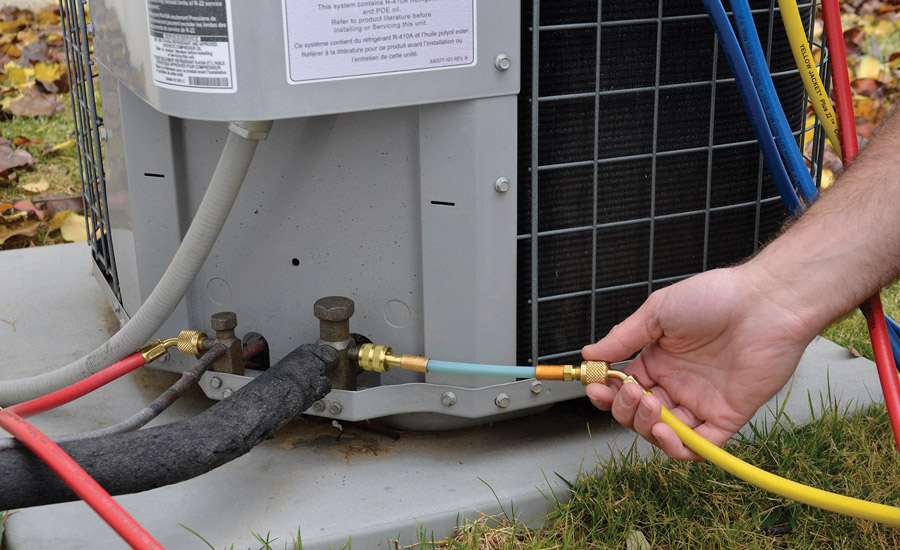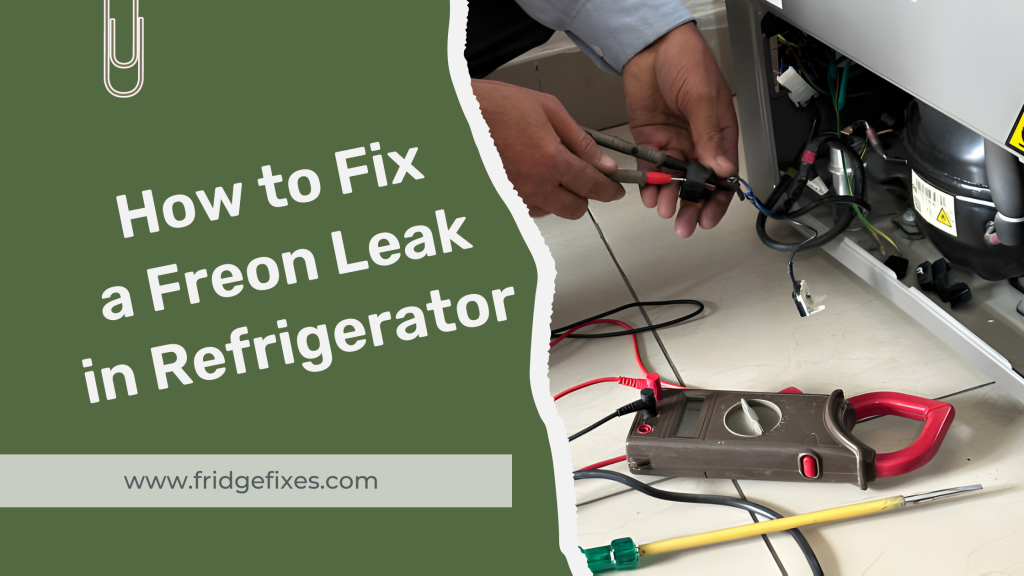To fix a Freon leak in a refrigerator, initially identify the source of the leak and then seal it using a leak repair kit. Professional help is recommended due to the complexity of the repair and the need to handle refrigerants safely.
Refrigerators rely on Freon—a term often used for a variety of refrigerants—to stay cold, but a leak can compromise their efficiency and safety. Spotting a Freon leak quickly is crucial as it can lead to increased energy costs, potential food spoilage, and environmental harm.
Managing a Freon leak yourself requires specialized tools and adherence to environmental regulations, leading many to seek certified technicians for the job. Tackling a Freon leak effectively ensures your refrigerator continues to operate smoothly while minimizing risks to health and the environment. Remember, proper disposal and handling of refrigerants is not only responsible but also mandated by law in many areas, emphasizing the importance of professional assistance in these scenarios.

Credit: lk.linkedin.com
Spotting Freon Leaks In Your Refrigerator
Identifying a Freon leak in your refrigerator is crucial for food safety and efficiency. Knowing the signs can save energy, money, and prevent potential health risks. A Freon leak might not always be obvious. Learn how to detect the subtle indicators that suggest your refrigerator might be losing Freon.
Tell-tale Signs Of A Freon Leak
- Hissing sounds: A tell-tale sound indicating the escape of gas.
- Chemical smell: A pungent odor similar to the smell of chloroform or ether.
- Freezer isn’t cold: Elevated temperatures inside the freezer suggest a cooling issue.
- Oily residue: Check for a greasy substance around the refrigerator’s pipes.
- Inconsistent motor run: The compressor runs longer than normal or cycles frequently.
Safety Precautions Before Handling Refrigerants
First and foremost, ensure the refrigerator is unplugged. Ventilate the area to prevent the inhalation of harmful gases. Wear protective gloves and goggles to shield skin and eyes. Avoid direct contact with refrigerants.
Remember, seeking professional help is the safest way to fix a Freon leak. Licensed technicians come equipped with the right tools and expertise to handle the refrigerant safely and efficiently.
Diagnosing The Issue
Detecting a Freon leak in your refrigerator is the first step toward resolution. Prompt identification and repair can prevent further damage, ensuring your appliance returns to optimal functioning swiftly.
When a refrigerator stops cooling as effectively as it should, a Freon leak could be the culprit. Freon, also known as refrigerant, is essential for your fridge’s cooling mechanism. Pinpointing where this potent chemical has escaped isn’t indeed child’s play, but it’s crucial. Let’s take a closer look at the common leak areas and tools required for a thorough leak detection.
Common Areas For Freon Leaks
Finding a Freon leak in your refrigerator is a process of elimination. Start by examining these common leak-prone areas:
- Evaporator coils – These can develop small holes over time.
- Condenser coils – Check for signs of damage or corrosion.
- Connections and joints – Frequent stress points where leaks might occur.
Often, the signs of leakage include oil residue or a hissing sound near the leak site. Identifying these signs early prevents costly repairs later. Remember, if you notice any of these signs, professional repair may be necessary.
Tools Needed For Leak Detection
Proper tools can simplify finding a Freon leak. Gather these items:
| Tool | Use |
|---|---|
| Electronic leak detector | For precise detection around typical leak points |
| UV dye and light | To spot leaks with fluorescent dye |
| Soapy water | Simple method for identifying smaller leaks |
With the right tools, you can detect Freon leaks quickly and address the issue effectively. Remember, safety first; always wear gloves and goggles when handling refrigerant chemicals. Should you have concerns, enlisting a refrigerator technician is the safest approach to repair leaks.
Timely action saves both food and energy. By using this strategic approach to diagnose Freon leaks, your refrigerator can return to peak performance swiftly. Equip yourself, inspect meticulously, and tackle those leaks head on!
Temporary Fixes For Immediate Relief
Encountering a Freon leak in your refrigerator can cause worry. Fortunately, there are temporary fixes available that offer immediate relief. Such measures buy you time until a professional can provide a permanent fix. Here’s what you can do:
Sealant Use For Small Leaks
Refrigerator leak sealants are options for small, manageable leaks. These are special substances designed to temporarily block holes where Freon escapes. Apply them directly to the affected area.
- Identify the leak using a soapy water solution.
- Follow the product instructions to the letter.
- Wear safety gloves and ensure the area is well-ventilated.
- Check for efficacy before restoring power to the fridge.
Diy Repair Tips
For hands-on individuals, DIY fixes can suffice until help arrives. Essential DIY tips include:
- Power off the refrigerator to prevent further damage.
- Use a refrigerator leak repair kit specific to your fridge model.
- Patch small holes with epoxy designed for refrigerators.
- Once applied, allow sufficient drying time.
- Test your refrigerator performance before regular use.
Professional Repair Solutions
Discovering a Freon leak in your refrigerator can be a cause for concern. It’s a complex issue that often requires expert attention. Professional repair is necessary to ensure the problem is fixed safely and appropriately. Let’s explore when to reach out to a technician and the costs you can expect.
When To Call A Technician
Identifying a Freon leak is the first step. Your refrigerator may need a technician if it’s not cooling properly, you hear a hissing sound, or notice a chemical smell. These signs suggest a professional should assess your fridge.
- Unusual noise from the refrigerator
- Puddles or oily residues near the fridge
- Increased electricity bills due to inefficient cooling
Costs Involved In Professional Repair
Repair expenses can vary widely. Technicians consider the leak’s severity, labor charges, and replacement parts. Here’s what to expect with professional repair costs:
| Service | Estimated Cost |
|---|---|
| Inspection and diagnosis | $50 – $100 |
| Freon refill | $100 – $350 |
| Parts replacement | $100 – $600 |
| Labor | $100 – $300 |
Remember, these are estimates; actual costs might vary. Contact a trusted technician for an accurate quote specific to your refrigerator’s issue.
Preventing Future Leaks
Fixing a Freon leak in your refrigerator proves necessary to restore its cooling efficiency. Yet, prevention is key to avoid repeat issues and costly repairs. Establish diligence in maintenance and consider an upgrade when the time is right.
Regular Maintenance Schedule
Maintaining your refrigerator can significantly reduce the risk of Freon leaks. Create a regular maintenance schedule to catch potential problems early. Here’s a simple checklist to follow:
- Inspect seals and hoses – Look for cracks or wear every six months.
- Clean coils – Dust off the condenser coils seasonally for optimal performance.
- Check temperature – Ensure your fridge maintains consistent cooling ranges.
Adhering to this routine not only prevents Freon leaks but also enhances the efficiency and longevity of your appliance.
Upgrading Your Refrigerator
If your refrigerator constantly needs repairs, investing in a newer model can be a wise decision. Modern refrigerators come with:
| Feature | Benefit |
|---|---|
| Improved Sealing | Better containment of gases |
| Energy Efficiency | Reduced power costs |
| Warranty | Coverage for future issues |
These advancements contribute to a lower chance of Freon leaks and the peace of mind that your food stays fresh.

Credit: www.delcohvac.com
Understanding The Environmental Impact
Identifying and fixing a Freon leak is more than just a repair, it’s a step towards protecting our planet. Leaks release Freon into the atmosphere, causing harm well beyond the kitchen. Let’s delve into what makes Freon a concern for the environment.
The Role Of Freon In Ozone Depletion
Freon is a chlorofluorocarbon (CFC), once widely used in appliances for its excellent refrigeration qualities. But there’s a catch.
- CFCs break down ozone molecules, causing thinning of the ozone layer.
- This protective layer shields Earth from harmful UV rays.
- Increased UV can lead to skin cancer and cataracts in humans.
- It also affects wildlife and degrades plastics, paints, and wood.
Global efforts like the Montreal Protocol aim to phase out CFCs due to these risks.
Safer Alternatives To Freon
With growing environmental awareness, the hunt for Freon alternatives is vital.
| Alternative | Benefits |
|---|---|
| HFCs (Hydrofluorocarbons) | Less impact on the ozone layer |
| HCs (Hydrocarbons) | Better energy efficiency and low global warming potential |
| CO2 (Carbon Dioxide) | Non-toxic and naturally occurring |
| Ammonia (NH3) | Effective refrigerant with a long history of use |
These alternatives are shaping the future of refrigeration. They keep our food cold and our planet safe.

Credit: www.achrnews.com
Frequently Asked Questions Of How To Fix A Freon Leak In Refrigerator
What Causes A Refrigerator Freon Leak?
Freon leaks in refrigerators are typically caused by a broken seal or a puncture in the refrigerant lines. Wear and tear over time can also lead to such leaks.
How Can You Detect A Freon Leak?
Detecting a Freon leak involves listening for hissing sounds or noticing a chemical smell. Technicians may use a leak detector device or soapy water to find the precise leak point.
Is Repairing A Freon Leak A Diy Task?
Repairing a Freon leak can be complex and often requires a certified technician. It involves hazardous materials and specialized equipment that may be beyond typical DIY capabilities.
What Are The Signs Of A Freon Leak In My Fridge?
Signs include a lack of cooling, ice buildup on the coils, and an unusual running of the compressor. You might also notice higher energy bills due to inefficiency.
Conclusion
Dealing with a Freon leak in your refrigerator can be daunting, yet it’s manageable with the right approach. Remember, safety first: always wear protective gear. For persistent issues, engage a professional. Regular maintenance prevents leaks and ensures your fridge runs efficiently.
Tackling the problem promptly will keep your appliance in top condition for years.

